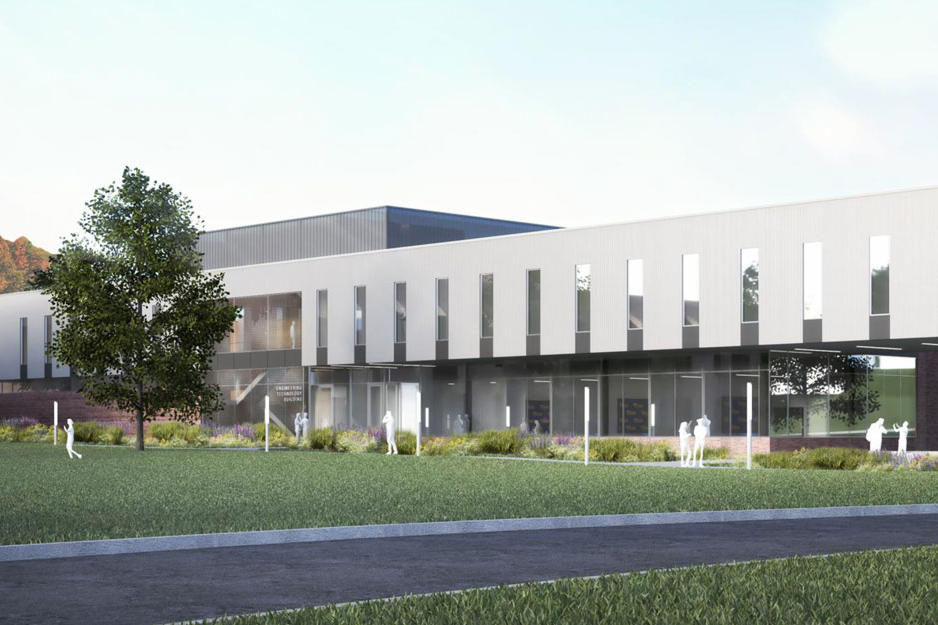Pitt-Bradford to break ground Friday on new academic building
Livestream of event available

The University of Pittsburgh at Bradford will break ground on its $24.5 million, 40,000-square foot Engineering and Information Technologies building Friday.
The 2:30 p.m. event will be livestreamed on Facebook, YouTube and at https://www.upb.pitt.edu/giving/engineering-and-information-technologies-building.
After a welcome from Jeannine Schoenecker, Advisory Board chair, remarks will follow from University of Pittsburgh Provost Ann Cudd, Rep. Marty Causer, R-Turtlepoint, and Interim President Rick Esch. Additionally, some of the supporters of the project will take part in helping to break ground for the new building.
“This is a really exciting project for Pitt-Bradford and for our region,” Esch said. “We welcome our friends and neighbors in the community to be part of the excitement by watching the livestream of this momentous occasion, which was nearly three decades in the making.
“This is the first academic building that the campus has built in two decades, and it’s going to provide a state-of-the-art home for our computer information systems and technology program, energy science and technology program, and two new engineering technology programs.”
Designed by HED of Michigan, the new building will be the center of technology and innovation on campus and across the region, chock full of rapid prototyping machines, oscilloscopes, engineering lab stations and more to provide hands-on technical learning for students.
At the heart of the building is a two-story atrium with collaborative space to enhance visibility, accessibility, interactions, and team building. A cantilevered, metal-clad faculty office “bar” will float above a mostly glass-enclosed first floor with large common area, providing a dynamic north edge for the newly formed quad. Strategic integration of glass reduces energy usage while preserving access to daylight and views. Exposed ceilings in the building’s centralized common area intentionally put building systems on display.
Rycon Construction Inc. of Pittsburgh will be the general contractor. Rycon previously built Sarah B. Dorn Residence Hall on campus. Allan Swanson of Bradford, who recently retired as owner of his own general construction business, Carl E. Swanson and Sons, will oversee the construction.
The building will be constructed on the lawn of Hanley Library and house two new engineering technology programs – mechanical engineering technology and energy engineering technology.
In the new building, engineering technology students will have hands-on labs and study applied mathematics. They will create on their own in a makerspace full of milling machines, lathes, welding equipment, metal cutting technology and 3-D printers and scanners.
Students in mechanical engineering technology will be able to design and build a prototype for an industrial process, then test them in labs for fluid dynamics, thermodynamics, strength of materials and electrical circuits.
Energy engineering technology students will learn about geology, combustion, automation and sensors, biofuels, wood chemistry, wind and solar power, and the chemistry of petroleum and natural gas.
Graduates with engineering technology degrees will be prepared to apply for and perform the same jobs as those with engineering degrees since they will take similar classes in math and engineering. However, the teaching and learning in the technology programs will be focused on practical applications.
Dr. Matt Kropf, associate professor of natural sciences and director of the engineering program, said, “Without this new building to house our special equipment and labs, we wouldn’t be able to offer our students these new engineering technology programs in which graduates are in demand.
“And without these new majors, our region’s need for a locally trained and skilled workforce would continue to go unmet in key areas. It’s incredible to see this project come to fruition, and one of the things I’m most excited about are the community aspects of it, including the possibility of developing a technology incubator.”
The new four-year programs will provide enhanced opportunities in the way of lab and testing equipment to continue engineering students’ hands-on experience.
Labs in the new building include
- A strength and materials lab
- A fluid dynamics lab with small hydro tunnel to test designs
- A circuit lab with bench space for soldering, generators and analog/digital trainer desktop kits
- A measurements lab for the energy engineering and energy science and technology programs where students will be able to work with sensors and automation
- A machine shop for first-year engineering students with computer-controlled cutters and plasma cutters used to cut through electrically conducive materials
- A makerspace with 3-D printing for rapid prototyping to be shared with the information technology program.
The content of a final lab is yet to be determined, but it will be a place where students can work on projects for competitions such as robotics, drones, and recreational or solar cars. The labs where students will be creating and fabricating are connected to each other to make working on projects easier.